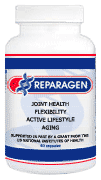 Yes, both were effective.
Yes, both were effective.
But, are they better than placebo?
First, the details
- 95 adults were randomly assigned to receive glucosamine sulfate or Reparagen (aka IGFlex).
- Reparagen contains 300 mg of vincaria (Uncaria guianensis) and 1500 mg of RNI 249 (Lepidium meyenii) administered by mouth, twice daily.
- Assessments were made over 8 weeks.
And, the results.
- Compared to the start of the study, both treatments showed significant benefits in WOMAC and visual analog scale outcomes within one week.
- There was progressive improvement over 8-weeks of treatment.
- Both treatment were well tolerated.
- Rescue medication use was significantly lower in the Reparagen group.
- Blood levels of IGF-1 (insulin-like growth factor) were unchanged.
- Studies suggest that IGF-1 works to protect and repair cartilage tissue.
The bottom line?
The response was similar for both treatments, but there’s no way to tell if they were better than placebo in this study.
A Cochrane review of glucosamine, summarized here, found the following.
- In 8 high quality studies, improvement in pain with glucosamine didn’t differ from placebo.
- But when all studies were analyzed, pain improved more than with placebo.
- Studies using the Rotta Pharmaceutical Company brand of glucosamine sulfate showed greater pain relief than placebo.
Considering that IGF-1 levels didn’t change and the controversy surrounding the analgesic effects of glucosamine, I think it’s premature to conclude that placebo-controlled studies are no longer needed for potential treatments of osteoarthritis of the knee.
Dr. Mark Miller from Albany Medical College in New York has published on this topic. He has also written an upbeat review. However, he describes positive changes in IGF-1, which were not seen in this study.
11/26/07 19:52 JR